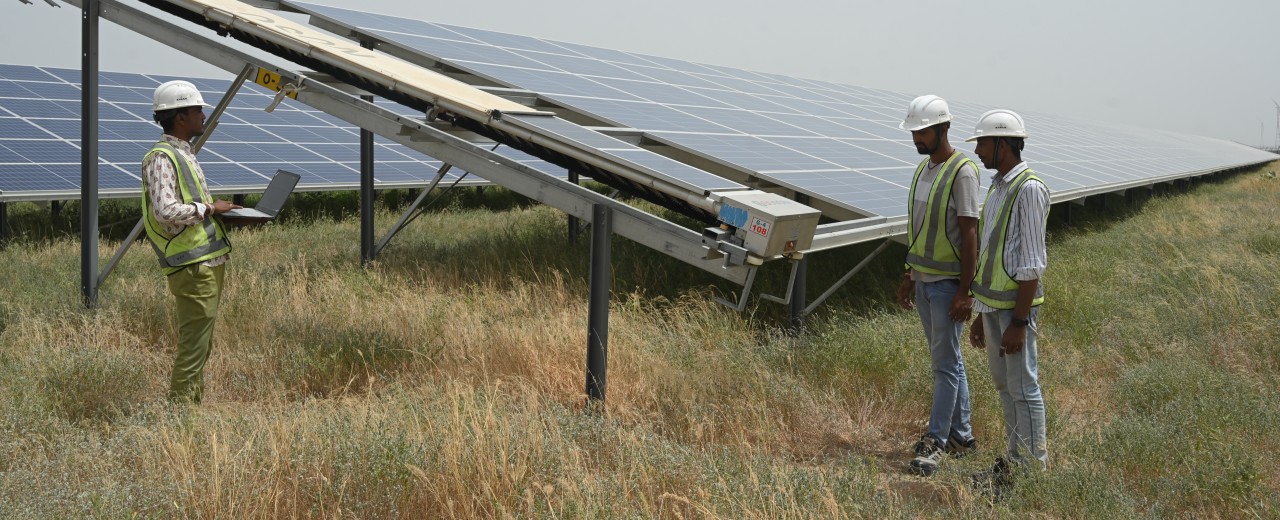News from 2024-10-24 / KfW Development Bank
A strong partnership for India’s energy transition
Germany supports numerous projects involving the use of solar energy

From solar power plants to solar-powered pumps: KfW is financing a wide range of projects to support India's energy transition on behalf of the German Federal Government. The effects extend far beyond the construction of the plants alone, with internationally used standards now being regularly applied, knowledge being built up and more than six million tons of carbon dioxide emissions being avoided each year.
India has exceptional conditions when it comes to using solar energy due to how much sun it experiences on a regular basis (far more than in Germany). This makes it an intelligent location in which to invest in solar power plants. The electricity generated by photovoltaic panels costs only half as much in India as it does in Germany. To leverage this potential and support the country in its transition to environmentally friendly energy, KfW provided EUR 1 billion in subsidised loans for projects that promote solar energy in India from 2017 to 2023. This was done on behalf of the Federal Ministry for Economic Cooperation and Development. Within this solar partnership, funds were provided for photovoltaic systems, standalone solutions, solar-powered pumps for irrigation and solar roofs.
A billion euros can make a big difference, with the effects extending far beyond simply installing these systems. The project partners acquire new knowledge and can plan and install similar systems themselves in the future. Investors are building trust in the technology.
The plants financed under the solar partnership replace the need to burn 4 million tons of coal annually. This coal now does not need to be mined, imported or transported, and greenhouse gas emissions or pollution from pollutants and particulate matter are eliminated.
The investments funded by KfW save over 6 million tons of carbon dioxide emissions annually – and will do so for around 25 years, given the expected service life of the systems. This means that three times more greenhouse gases that would adversely affect the environment can be saved per euro invested in India than if the same measures were taken in Germany.
Creating acceptance
The solar power plant in Sakri is a prime example of just how much the long-term cooperation between Germany and India pays off. KfW financed the site back in 2013. Generating 125 MW, it was the largest plant of its kind in India at the time. Since then, the solar power plant has saved 155,000 tons of carbon dioxide every year and now supplies electricity to 220,000 households. Most importantly, the plant showed that using solar energy on a large scale is profitable in India. It created broad acceptance of solar energy in the country.
The electricity generated by the sun and wind needs to be transported to the consumers, which requires efficient and effective electricity grids. KfW has been committed to creating “green corridors” for years, i.e. electricity routes that transport energy primarily from the north of the country to the metropolitan regions in the south. This creates synergy with projects involving solar energy.
Following international standards
Environmental and social studies were always carried out for KfW-financed projects in order to avoid adverse impacts and ensure appropriate compensation for owners whose land was used. Extensive analyses have determined the standards to be complied with, e.g. to use less water to clean modules or to protect endangered species. The technical quality of the structures is also evaluated on the basis of international standards with the support of experts from KfW. These standards represented a new development for most project partners. In the future, many will incorporate these minimum requirements in tenders for their own projects. To this end, the German-Indian solar partnership is also helping to ensure that international standards are followed.
New technologies will make it possible to further expand the solar partnership and support India’s energy transition with even greater effect. These innovations include better storage media and green hydrogen.
The German-Indian solar partnership has evolved over many years, leading to a strong basis of mutual trust – essential when it comes to working together to find constructive, cost-effective solutions for climate action.
The 29th United Nations Climate Change Conference will take place in November in Baku (Azerbaijan).

Share page
To share the content of this page with your network, click on one of the icons below.
Note on data protection: When you share content, your personal data is transferred to the selected network.
Data protection
Alternatively, you can also copy the short link: https://www.kfw-entwicklungsbank.de/s/enzBWrMC.DJrA
Copy link Link copied